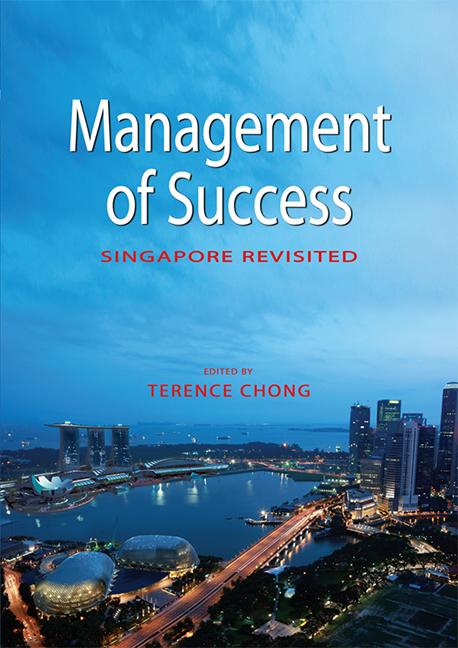Book contents
- Frontmatter
- Contents
- List of Tables and Figures
- Foreword
- Message
- Quote
- Preface
- The Contributors
- 1 Introduction: The Role of Success in Singapore's National Identity
- SECTION 1 SINGAPORE IN THE BIGGER PICTURE
- SECTION 2 LEADERSHIP, POLICY AND POLITICS
- SECTION 3 THE RESTRUCTURING OF THE ECONOMY
- SECTION 4 THE TRANSFORMATION OF SOCIETY
- SECTION 5 THE LAW
- SECTION 6 MODIFICATION OF THE ENVIRONMENT
- SECTION 7 COMMUNITY AND NATIONAL SECURITY
- SECTION 8 LIFE IN SINGAPORE
- 26 Culture, the Arts and the Global City
- 27 Fluid Nation: The Perpetual “Renovation” of Nation and National Identities in Singapore
- 28 Suffer the Rebellious Children: The Politics of Remaking Singapore and the Remaking of Singapore Politics
- 29 “It's Like Rice on the Table, It's Our Common Dish”: The English Language and Identity in Singapore
- 30 Multiculturalism and the Problem of Solidarity
- 31 Sexual Governance and the Politics of Sex in Singapore
- 32 Conclusion
- Index
29 - “It's Like Rice on the Table, It's Our Common Dish”: The English Language and Identity in Singapore
from SECTION 8 - LIFE IN SINGAPORE
Published online by Cambridge University Press: 21 October 2015
- Frontmatter
- Contents
- List of Tables and Figures
- Foreword
- Message
- Quote
- Preface
- The Contributors
- 1 Introduction: The Role of Success in Singapore's National Identity
- SECTION 1 SINGAPORE IN THE BIGGER PICTURE
- SECTION 2 LEADERSHIP, POLICY AND POLITICS
- SECTION 3 THE RESTRUCTURING OF THE ECONOMY
- SECTION 4 THE TRANSFORMATION OF SOCIETY
- SECTION 5 THE LAW
- SECTION 6 MODIFICATION OF THE ENVIRONMENT
- SECTION 7 COMMUNITY AND NATIONAL SECURITY
- SECTION 8 LIFE IN SINGAPORE
- 26 Culture, the Arts and the Global City
- 27 Fluid Nation: The Perpetual “Renovation” of Nation and National Identities in Singapore
- 28 Suffer the Rebellious Children: The Politics of Remaking Singapore and the Remaking of Singapore Politics
- 29 “It's Like Rice on the Table, It's Our Common Dish”: The English Language and Identity in Singapore
- 30 Multiculturalism and the Problem of Solidarity
- 31 Sexual Governance and the Politics of Sex in Singapore
- 32 Conclusion
- Index
Summary
THE DOMINANCE OF ENGLISH NATIONALLY AND PREDOMINANCE AT HOME: IMPLICATIONS
In the 1989 volume of Management of Success, Nirmala Purushotam concluded her chapter on “language and linguistic policies” at the threshold of 1987. That was the year when English, already the working language of Singapore and one of the four official languages, formally became the sole medium of instruction as well in the newly created single “national stream” or “national system of education”. She welcomed English with anticipation as “the language of promise”, her chapter having dwelt on two important contemporary issues. One was the long-standing sociologists’ concern with regard to the state's “model of multilingualism” which in making each school child learn its assigned “mother tongue”, encouraged (as Benjamin had first observed a decade ago with regard to the multiracialism policy) “ethnic segregation” rather than integration through the fostering of a national identity which transcends ethnicity. The other was whether the state's management of the rivalry between English and Mandarin Chinese for dominance would be a long-term success.
More than twenty years on, the government's education and bilingualism policies have been so successful that English is undoubtedly the dominant language and common tongue nationally. It is sometimes even regarded as the de facto National Language of Singaporeans. Currently, the large majority of the resident population under fifty years old could be said to be what linguists call “Englishknowing bilinguals” which in Singapore means knowing English (often as their “first language”) and a “second language” or “mother tongue”. (Those who were Chinese-educated will have learned English, too, albeit as their “second language” in school.) English is now increasingly “the predominant home language among all ethnic groups”, according to the latest General Household Survey of 2005 and that moreover, “the population of resident students speaking English at home also increased significantly among all ethnic groups”.
Undeniably, the People's Action Party (PAP) government's multilingualism and bilingualism policies — predicated on English as the working and common language — and the planning that went with them are remarkable achievements and were necessary in light of the political situation of the time. So is the corresponding creation of a national system of education where English as a medium of instruction was gradually phased in with “patient pragmatism” over a period of some twenty years (1966–86).
- Type
- Chapter
- Information
- Management of SuccessSingapore Revisited, pp. 536 - 560Publisher: ISEAS–Yusof Ishak InstitutePrint publication year: 2010

